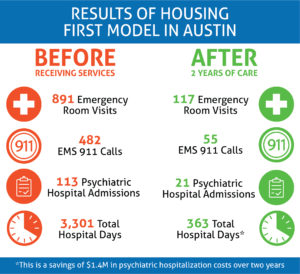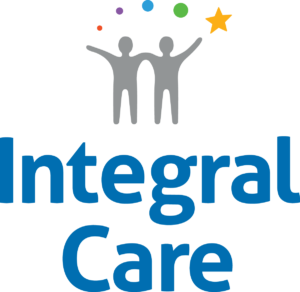TRANSPARENCIES
a monthly newsletter from Integral Care
a monthly newsletter from Integral Care
Adjustments to a city ordinance last July made public camping legal and homelessness more visible in our city. It has become a wake-up call to our community that this is a serious problem, and must be addressed. Stricter city ordinances are now in place, banning people experiencing homelessness from blocking sidewalks. Also banned is camping, sitting or lying down within 15 feet of business entryways, and within a quarter mile of the Austin Resource Center for the Homeless (ARCH) or other downtown shelters.
To prepare for the new ordinance revisions, the City of Austin and homeless service providers jumped into action with a new encampment strategy response called Guided Path. Guided Path partners – including Integral Care – are amplifying ongoing outreach efforts and collaborating in a more coordinated effort than ever before. As both a significant provider of homeless and housing services and the Local Mental Health Authority (LMHA), we bring 20+ years of experience in this realm to the Guided Path initiative. In our Authority role, our work strengthens local systems, including leveraging and increasing resources for greater impact. Partners include Austin Recovery, Caritas of Austin, Casa Marianella, Communities for Recovery, ECHO, Family Eldercare, Foundation Communities, Foundation for the Homeless, LifeWorks, SAFE Alliance, Salvation Army, The Other Ones Foundation and more. Strengthening the health of our growing city and supporting our neighbors living with homelessness requires teamwork and continuous innovation.
Over that last two weeks, the Guided Path team of experts surveyed and assessed every person living around the ARCH in an effort to rapidly connect them with the support they need – housing resources, case management, shelter beds, and treatment for substance use disorder, mental health issues and chronic health conditions. The focus is on getting people into housing. Through the initiative, the team will follow each individual until we resolve their housing crisis. A safe, stable home is the foundation we all need to do well physically, emotionally, socially and financially.
The team has worked quickly and is seeing results. On October 16th, the Homeless Outreach Street Team and Front Steps staff began speaking with every person sleeping outside the ARCH to start the process of resolving each individual’s housing crisis. Since the initiative’s kick-off:
The Guided Path initiative also aims to streamline and shape the City’s system of homeless care. In addition to connecting people to housing, shelter and ongoing care, the Guided Path team is looking closely at the existing system, identifying gaps and working together to address them so the initiative can be scaled to positively impact other parts of the city.
As a result of the ordinance change, people who remain outside the ARCH may now face ticketing and possibly arrest. Barriers such as criminal justice involvement can prevent someone from getting housing and impact employment opportunities. Thus is the vicious cycle of homelessness when low-barrier, affordable housing is so scarce.
Making more low-barrier, affordable housing in Austin available will help end homelessness in our city. Large cities across the US, Canada and Europe are discovering that the evidence-based Housing First model is a solution that works. It is affordable, permanent supportive housing with wraparound support services, such as case management, primary and mental health care, substance use treatment and employment services. Integral Care recently completed construction of Terrace at Oak Springs, the first of its kind Housing First apartment community in Central Texas with an onsite primary and mental health care clinic. 50 people experiencing homelessness, including 25 veterans, will soon call Terrace at Oak Springs home.

Housing First works. One person experiencing chronic homelessness can cost taxpayers as much as $30,000 to $50,000 per year. The Housing First model saves public dollars in shelter stays, hospital stays, emergency room visits and nights in jail. Integral Care has followed this model since 2013. A 2018 report highlighted the following impact and savings over 2 years for 115 Integral Care clients housed through the Housing First model.
Integral Care is committed to working with the City and our partners to support our neighbors experiencing homelessness, moving people as quickly as possible from homeless to housed. Together, we can prevent and end homelessness, for the health of our entire community.

David Evans
Chief Executive Officer
Our Role as the Local Mental Health Authority
 In addition to being a significant provider of homeless services, Integral Care holds a unique role in our community as the state-designated Local Mental Health Authority (LMHA). As the LMHA, we work to strengthen local systems including leveraging and increasing resources for greater impact. Whenever possible, we collaborate with other organizations to support their work and strengthen our entire community. Together, we are able to support the health and well-being of more people.
In addition to being a significant provider of homeless services, Integral Care holds a unique role in our community as the state-designated Local Mental Health Authority (LMHA). As the LMHA, we work to strengthen local systems including leveraging and increasing resources for greater impact. Whenever possible, we collaborate with other organizations to support their work and strengthen our entire community. Together, we are able to support the health and well-being of more people.
Being able to end homelessness requires resources from multiple sources. HUD housing vouchers are a critical tool that the Housing Authority for the City of Austin and the Travis County Housing Authority bring to our community to cover the cost of rent. Integral Care plays a key role in securing the required local match that allows our community to use vouchers to end homelessness. Together our agencies are expanding access to much needed housing.
Vouchers are only part of the continuum of care we support as the LMHA. With funds from the state of Texas through a Healthy Community Collaborative (HCC) grant, we help our collaborators in homelessness to build the health and well-being of our neighbors experiencing homelessness. State funds allow us to support:
Integral Care is committed to supporting people experiencing homelessness in our community, both as the LMHA and a provider of homeless services. Thank you to the state and all of our funders for helping us amplify the important work of our partners while we support our neighbors in recovery from homelessness, mental health issues and substance use disorders.
City of Austin
The City of Austin’s continued focus on homelessness demonstrates a commitment to preventing and ending homelessness in our community. It is one of our greatest shared goals. Incidentally, the City is Integral Care’s longest-standing collaborator, along with Travis County. They are a deep and meaningful collaborator, supporting us since our inception in 1967.
Through interlocal agreements, the City invests dollars that support our function as the Local Mental Health and Intellectual and Developmental Authority for the area, as well as our role as a service provider. This funding helps with authority functions such as community planning activities and resource development to address gaps and needs in our community. Every dollar invested by the city leverages state dollars to advance our mission to provide Healthy Living for Everyone.
The city’s investment of nearly $7.5 million in Fiscal Year 2020 provides for HUD supported housing and homelessness services, substance use disorder services, early childhood intervention (ECI), services for youth experiencing behavioral health challenges and people with intellectual and/or developmental disabilities (IDD), Assertive Community Treatment (pdf) for people who experience frequent and intensive psychiatric emergencies or involvement with the criminal justice system, HIV services and more.
Beyond the financial investment, Integral Care values our strong working relationship in joint programs with the city – including the Homelessness Outreach Street Team, Road to Recovery, and other multi-faceted collaborative efforts.
Integral Care is grateful to the City of Austin, our elected leaders and city staff. Thank you for working every day to help ensure that everyone in our city has the tools to reach their full potential.
September 2019: Making Strides for World Mental Health
August 2019: Working Together for Child & Youth Mental Health
July 2019: Legislative Wrap-Up – Some Bipartisan Wins for Healthcare
June 2019: Strengthening Access for Veterans and the Entire Military Family
May 2019: Women and Mental Health
April 2019: Legislative Session Status Report
March 2019: Making Opportunities for Recovery More Accessible
February 2019: Recovery is Possible
January 2019: Stronger Outcomes Through Collaboration
December 2018: Looking ahead to the 86th Texas Legislature
November 2018: How Tech is Changing the Face of Mental Health
October 2018: A Few Questions Could Help Save a Life
September 2018: Anyone Can Save a Life
August 2018: A Milestone Moment
July 2018: Equity in Mental Health Care for All
June 2018: Expanding Services for Veterans
May 2018: Your Mental Health Toolkit
April 2018: Time of Terror Calls for Increased Emotional Support
March 2018: Stopping the cycle of incarceration for individuals with mental illness
February 2018: Equity in mental healthcare for everyone
January 2018 : Improving Mental Health Through Partnership & Collaboration
December 2017: Strength Through Community
November 2017 : Healthy Lifestyles Improve Well-Being
October 2017 : National Child Health Day
September 2017 : Strengthening Families and Communities